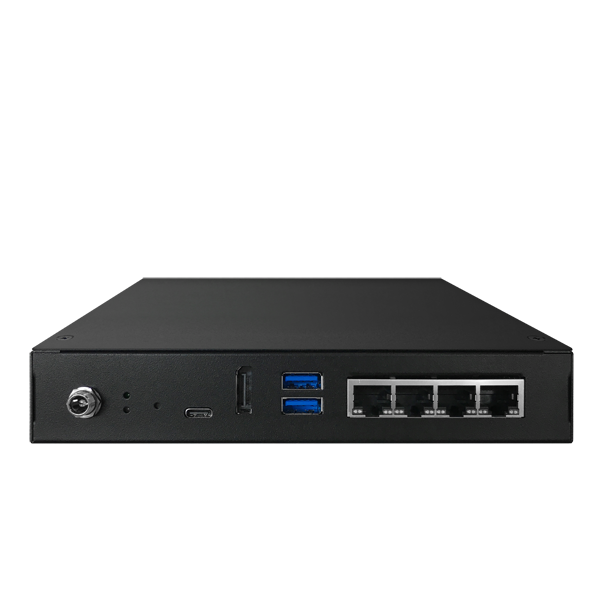- Intel Atom x7211RE Processor (Amston Lake, Dual-Core)
- 1 x DDR4 SO-DIMM (up to 16GB 3200MHz)
- 4 x 2.5GbE RJ45 ports
- 1 x M.2 SATA SSD storage (8GB eMMC optional)
- 1 x M.2 SATA SSD storage (8GB eMMC optional)
- 1 x M.2 SATA SSD storage (8GB eMMC optional)
Contact us, for customized product package!
Get A Quote
The CAF-0120 is a fan-less networking appliance for small to medium-sized organizations and enterprise branch offices. This desktop device in a compact form factor is destined to be used as security solutions like VPN gateways or NGFW (next-generation firewalls) that use the processor-integrated acceleration of Artificial Intelligence (AI). The CAF-0120 can protect company networks even better from cyberattacks through AI, while also serving as a secure SD-WAN solution to provide fast and reliable networking for remote branch locations due to its high-speed Ethernet ports.
The latest generation of Intel’s Atom SoC called “Amston Lake” supports AI with Intel’s Deep Learning Boost (DL Boost) through its Gracemont architecture with Vector Neural Network Instructions (VNNI), that improve AI performance especially for inferencing. The CAF-0120 uses the Atom x7211RE of this CPU family to make the device an ideal platform for AI-powered cybersecurity. Examples are VPN gateways, that use AI to optimize finding the fastest and most secure server for connecting to remote locations, or NGFW with AI capabilities to more effectively identify both known and unknown threats within network traffic.
The Intel Atom x7211RE can accelerate these tasks at a mere 6 watts of power consumption, while handling up to 16GB of main memory, eMMC and/or a SSD for storage space and four 2.5GbE RJ45 ports. All this is possible without noisy active cooling, as the processor can be cooled fan-less. Additionally, the CAF-0120 can optionally be equipped with a DisplayPort for external monitors and an onboard secure crypto processor to support TPM 2.0 for higher security through trusted authentication.
The latest Atom “Amston Lake” processors based on the “Gracemont” architecture are not only faster than their predecessor using “Tremont” because of higher clock speeds and bigger integrated cache sizes, they are also more power-efficient because of an improved manufacturing process. They furthermore support hardware virtualization and Intel’s OpenVINO toolkit, with pre-optimized libraries for artificial intelligence (AI), machine learning (ML), and computer vision acceleration.
- Specifications





